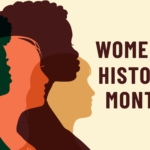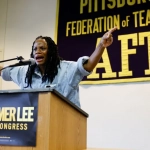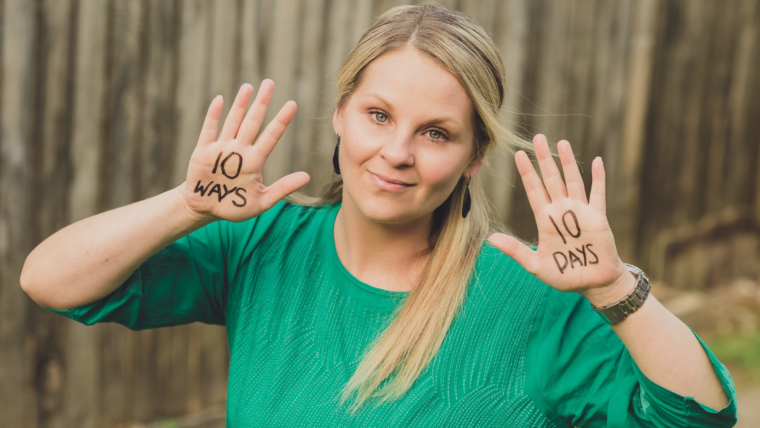
10 Revolutionary Women Poets in U.S. History and Present
by CLAIRE KENNY
Poetry has always been a powerful tool for women to verbalize their lived experiences and inspire others with their resilience against patriarchal constrictions. As National Poetry Month comes to an end, we’re honoring women poets who defied literary norms, navigated cross-cultural boundaries and revolutionized what we consider poetry.
These 10 women are just a few of many catalysts who harnessed language as power for feminist change. Their works have helped bring feminists together to communicate their struggles, and they have put words to feelings that women experience universally.
1. Maya Angelou (1928–2014)
“Out of the huts of history’s shame / I rise / Up from a past that’s rooted in pain / I rise.”~Maya Angelou, “Still I Rise” (1976)
As a poet, educator and civil rights activist, Maya Angelou has uplifted generations of women with her strength and persistence. In her childhood, she experienced traumatic sexual assault and became mute for five years. However, her love of language propelled her forward into a career of prolific writing, and she became a trailblazer of racial justice and feminist activism in the field of literature.
After hearing Dr. Martin Luther King, Jr., speak at the Harlem Writers Guild in the late 1950s, Angelou knew she wanted to participate actively in the civil rights movement. She worked for Dr. King and Malcolm X, and served on presidential committees for both Gerald Ford in 1975 and Jimmy Carter in 1977.
As the inaugural poet for Bill Clinton in 1993, she presented her poem “On the Pulse of Morning,” (1993) which echoed Dr. King’s call for peace, acceptance and racial justice.
Though not considered poetry but rather an autobiography, her book I Know Why the Caged Bird Sings (1969) also gained national recognition, partly due to its open, rare and courageous discussion of sexual abuse.
2. Gwendolyn Brooks (1917–2000)
“Exhaust the little moment. / Soon it dies. / And be it gash or gold it will not come / Again in this identical disguise.”~Gwendolyn Brooks, Annie Allen (1949)
Gwendolyn Brooks, the first Black author to win the Pulitzer Prize and the first Black woman to become poetry consultant to the Library of Congress, focused heavily on civil rights activism in her writing. At 17 years old, she began publishing poems frequently in the Chicago Defender, an anti-racism newspaper supporting Chicago’s Black community.
In her first collection, A Street in Bronzeville (1945), Brooks centered the experiences of poor, urban, Black individuals. She wrote not only about prejudice they faced from white people, but also from lighter-skinned Black people, as she described in Maud Martha (1953). Critic Annette Oliver Shands said her works seemed “to assert humanness with urgency.” To further nurture and support Black literature, she left the publishing company Harper & Row to work with budding Black publishing companies.
3. Theresa Hak Kyung Cha (1951–1982)
“The ink spills thickest before it runs dry before it stops writing at all.”~Theresa Hak Kyung Cha, Dictée (1982)
Theresa Hak Kyung Cha’s works tackle the traumatic experiences she grappled with as a South Korean American and emphasize the role of women as warriors.
Her most famous work, Dictée (1982), is often considered a novel, but many call it a collection of experimental poetry. It includes subjects like Japanese occupation, displacement, exile and the diaspora that her family faced firsthand. Dictée centers the stories of several courageous women: the Korean revolutionary Yu Guan Soon, Joan of Arc, Saint Thérèse of Lisieux, Demeter, Persephone, her mother and Cha herself. The New York Times described the novel as “an essential work for feminist writers” that highlighted “the fractured immigrant experience.” Shortly after her publication of Dictée, she was killed by a security guard at the Puck Building in New York City. The activism of her poetry inspires women to this day.
4. Emily Dickinson (1830–1886)
“I dwell in possibility.”~Emily Dickinson
Dickinson shattered conventional norms in poetry not only with her use of unconventional structure, but also by challenging mainstream thought in science and religion. She advocated for respect towards nature through her poems, criticizing the mainstream 19th century emphasis on studying nature without appreciating its beauty. It seems she argued that this tendency in academia was dehumanizing to the souls of all species.
She wrote, “A monster with a glass / Computes the stamens in a breath – / And has her in a ‘class!’”
Dickinson also expressed her beliefs with unshrinking honesty when it came to religion. When Mary Lyon, the head of the Mount Holyoke Women’s Seminary, asked everyone who wanted to be Christian to stand, Dickinson stayed seated. She said people probably wondered why she didn’t stand, but that it would be stranger if she lied. She expressed this doubt about religion in her poems, like “You’re right – ‘the way is narrow,’” which concludes with ambivalence: “And after that – there’s Heaven – / The Good man’s – “Dividend” – / And Bad men – “go to Jail” – / I guess –”
5. Joy Harjo (1951–present)
“An ancient chant / that my mother knew / came out of a history / woven from wet tall grass / in her womb.”~Joy Harjo, “The Last Song” (1975)
Joy Harjo, a member of the Muscogee (Creek) Nation, is a former U.S. poet laureate and the first Indigenous person to hold that position. Her poetry discusses the injustices committed against indigenous peoples, starting with her nine-poem chapbook titled The Last Song (1975). Her writing honors the values of Indigenous cultures, as well as the values of feminism—interweaving powerful stories about women throughout. In her poem “She Had Some Horses,” she represented a woman’s internal conflict to feel unified even while experiencing contradictory feelings within herself. She also wrote about the murder of an indigenous leader and its effect on her community in Mad Love and War (1990).
Poet Adrienne Rich said of her work, “I turn and return to Harjo’s poetry for her breathtaking complex witness and for her world-remaking language: precise, unsentimental, miraculous.”
6. Ada Limón (1976–present)
“If we could light up the room with pain, / we’d be such a glorious fire.”~Ada Limon, Bright Dead Things (2015)
Ada Limón is the current U.S. Poet Laureate and the first Latina woman to hold that position. Her writing manifests bravery and truth, and it covers all extremes of human emotion. Her work continues to get widespread praise, including a National Book Critics Circle Award for Poetry with her book The Carrying (2018). In The Carrying she wrote honestly about experiences unique to women, such as caring for aging parents and struggling with infertility: “What if, instead of carrying / a child, I am supposed to carry grief?” Like Dickinson, Limón writes about nature with careful detail and integrity. Vanity Fair described her writing as holding a “keen attention to the natural world” and a sense of “incredible emotional honesty.” Of her work The Hurting Kind (2022), NPR commented on the ornate yet broad nature of her poems: “She connects big ideas—fear, isolation, even death—with little details, like field sparrows, a box of matches or ‘the body moving / freely.’”
7. Audre Lorde (1934–1992)
“Your silence will not protect you.”~Audre Lorde, Sister Outsider: Essays and Speeches (1984)
Racial justice and LGBTQ+ advocate Audre Lorde helped bring together the national community of feminists through forthright and moving written works. Her own experiences as a Black lesbian and a breast cancer survivor shaped her work, as she wrote pieces like The Cancer Journals (1980) and Sister Outsider: Essays and Speeches (1984). Lorde made a rebellious step forward in building feminist solidarity when she did not wear a prosthesis after her mastectomy. She said, “If we are to translate the silence surrounding breast cancer into language and action against this scourge, then the first step is that women with mastectomies must become visible to each other.”
In 1981 Lorde and fellow writers Cherríe Moraga and Barbara Smith founded Kitchen Table: Women of Color Press, which they dedicated to promoting the written works of black feminists. She also wrote about South Africa under apartheid and founded the group Sisterhood in Support of Sisters in South Africa. Lorde emphasized intersectionality as germane to the feminist movement and believed women should not ignore distinctions in race, class, gender and sexuality, but rather acknowledge and celebrate their uniqueness.
8. Sylvia Plath (1932–1963)
“Know you appear / Vivid at my side… / Though it’s quite clear / All your beauty, all your wit, is a gift, my dear, / From me.”~Sylvia Plath, Sylvia Plath, The Collected Poems (1956)
Sylvia Plath transformed poetry as a pioneer in the style of “confessional” writing: the technique of openly recounting one’s personal hardship that former writers often did not dare to undertake. Her poetry represents the expansive group of women who, when showing too much intellect or freedom, eventually faced punishment from a patriarchal social system. Particularly revolutionary about Plath was her open discussion of the mental illness challenges she faced as a woman. Her most famous work, The Bell Jar (1961), strongly mirrored her own experience with mental breakdowns and hospitalization as it described the mental breakdown and eventual recovery of a young college girl.
When Plath took her own life, it represented to many feminists the consequences of living in an oppressive, patriarchal society and the pressure women felt to conform to unfair expectations. Critic Charles Newman wrote, “[Her literature] gives us one of the few sympathetic portraits of what happens to one who has genuinely feminist aspirations in our society.”
9. Adrienne Rich (1929–2012)
“Our future depends on the sanity of each of us, and we have a profound stake, beyond the personal, in the project of describing our reality as candidly and fully as we can to each other.”~Adrienne Rich, On Lies, Secrets, and Silence. Selected Prose (1966-1978)
Adrienne Rich was a fierce advocate for women, lesbians and mothers, and she shed new light on what it meant to hold these identities. In Snapshots of a Daughter-in-Law (1963) and Of Woman Born: Motherhood as Experience and Institution (1976), she reflected on her difficulties as a mother and wife in the 1950s and revealed a pivotal perspective of traditional motherhood as subjugation. She also directly represented lesbian sexuality and desire in works like Twenty-One Love Poems (1977) and Dream of a Common Language (1978).
Rich participated in political activism: In 1968, she signed the “Writers and Editors War Tax Protest” pledge, pledging to refuse tax payments in protest against the Vietnam War. Then, in 1997, she declined the National Medal of Arts to protest House Speaker Newt Gingrich’s vote to end funding for the National Endowment for the Arts. Like Lorde, Rich protested the damaging nature of “white feminism” and fought for intersectionality, especially in her book Blood, Bread, and Poetry: Selected Prose, 1979-1985.
10. Phillis Wheatley (1753–1784)
“Let virtue reign and then accord our prayers / Be victory ours and generous freedom theirs.”~Phillis Wheatley
At about seven years old, Phillis Wheatley was forcibly removed from her home in West Africa and transported to Boston, M.A. on a ship carrying people of color considered too frail to work. In ensuing years, her writing as an enslaved person helped catapult the anti-enslavement movement in its early years and won her national influence. In her best-known poem, “On Being Brought from Africa to America,” (1773) she bravely insisted that white leaders of the Great Awakening include Black people in the Christian movement: “Remember, Christians, Negroes, black as Cain, / May be refin’d and join th’ angelic train.” Though she died tragically young, the empowering sentiments of her poetry have spanned centuries. Her words bring attention to the injustice of Black people’s exclusion from the Christian religious movement and the reality of racist oppression: “But how presumptuous shall we hope to find / Divine acceptance with the Almighty mind / While yet o deed ungenerous they disgrace / And hold in bondage African blameless race.”






